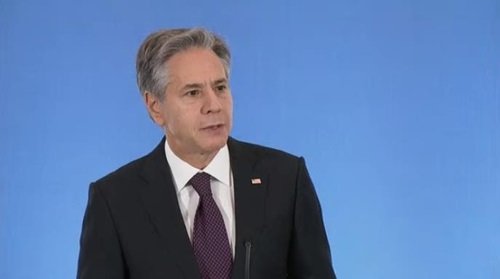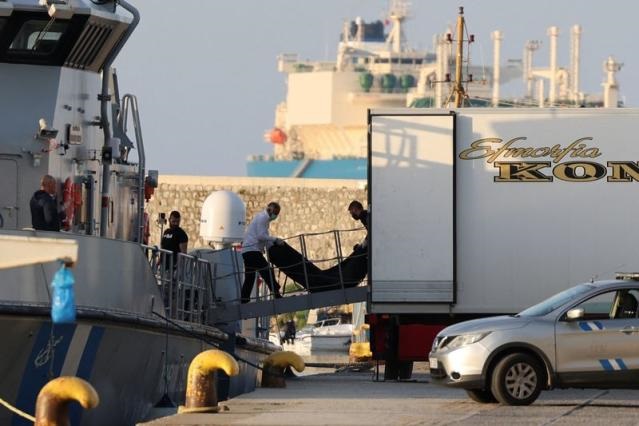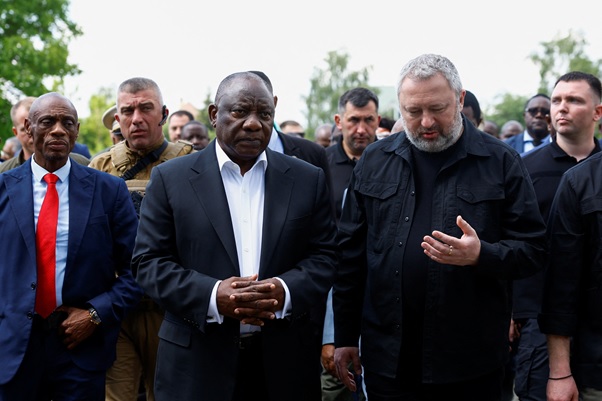2023 Trafficking in Persons Report: Liberia
Office To Monitor And Combat Trafficking In Persons
Today, U.S. Secretary of State Anthony Blinken released the 2023 Trafficking in Person (TIP) Report. The report puts Liberia on Tier 2, citing the government of Liberia does not fully meet the minimum standards for the elimination of trafficking but is making significant efforts to do so.
The TIP Report assesses government efforts around the world to combat human trafficking and highlights strategies to address this crime and protect the victims. This year’s report, which the 23rd edition, includes narratives for 188 countries and territories, including the United States.
However, the report says the government of Liberia demonstrated overall increasing efforts compared with the previous reporting period, considering the impact of the COVID-19 pandemic, if any, on its anti-trafficking capacity; therefore Liberia remained on Tier 2.
These efforts included prosecuting and convicting an official complicit in human trafficking and identifying more victims and referring them to services. However, the government did not meet the minimum standards in several key areas. Investigations decreased and law enforcement officials continued to lack adequate resources and understanding of trafficking to effectively investigate and prosecute trafficking crimes. Victim services, especially shelter, remained insufficient.
PRIORITIZED RECOMMENDATIONS:
Expand victim services – particularly for victims outside the capital, males, and victims requiring long-term care.
Increase efforts to investigate and prosecute trafficking cases, including those involving internal trafficking, sex trafficking, related criminal networks, and officials accused of complicity.
Train labor inspectors and social workers on standard victim identification procedures and the national referral mechanism.
Improve collaboration between anti-trafficking police units, immigration, labor, and judicial authorities.
Increase financial or in-kind support to NGOs that support trafficking victims.
Train law enforcement and judicial officials on identifying, investigating, and prosecuting trafficking cases under the revised 2021 anti-trafficking law.
Increase labor inspections in the informal sector and mining regions to improve identification of trafficking cases, including child forced labor.
Increase efforts to raise public awareness of human trafficking, including internal trafficking.
Allocate financial and in-kind resources to the national anti-trafficking task force.
Screen foreign workers, including Cuban overseas workers, for forced labor indicators and refer identified forced labor victims to appropriate services.
PROSECUTION
The government maintained law enforcement efforts. The 2021 Revised Act to Ban Trafficking in Persons Within the Republic of Liberia criminalized all forms of sex and labor trafficking and prescribed minimum sentences of 20 years imprisonment, which were sufficiently stringent and, with respect to sex trafficking, commensurate with those prescribed for other serious crimes, such as kidnapping. The Revised Act to Ban Trafficking in Persons Within the Republic of Liberia amended the 2005 Act to Ban Trafficking in Persons and brought Liberia’s trafficking laws in line with international law.
The government investigated eight trafficking cases, involving 12 suspects, including five for labor trafficking and three for unspecified forms of trafficking, and continued investigations of seven cases involving eight suspects. This compared with investigating 13 trafficking cases involving an unknown number of suspects in the previous reporting period. The government initiated prosecution of 13 defendants and continued prosecuting three defendants from the previous reporting period.
This compared with prosecuting 12 defendants in the previous reporting period. Of those prosecuted, 15 individuals were prosecuted under the Revised Trafficking in Persons Act of 2021 and one was prosecuted under the previous 2005 law. The courts convicted four traffickers, three for labor trafficking and one for an unspecified form of trafficking, compared to eight convictions during the previous reporting period. Sentences ranged from three to 25 years’ imprisonment.
Three of the convictions were obtained under the Revised Trafficking in Persons Act of 2021 and one was obtained under the previous 2005 law. In previous reporting periods, observers noted the government sometimes prosecuted and convicted crimes as human trafficking which lacked a clear element of exploitation. The Ministry of Labor (MOL) had the authority to prosecute trafficking and child labor cases. Officials continued to lack understanding of internal trafficking, and some continued to view forms of trafficking, especially of children for forced domestic servitude, as a community practice rather than a crime. Prosecutors may have pursued other charges, including rape and child endangerment in lieu of sex trafficking or child forced labor, due to a lack of understanding of human trafficking.
For the first time, the government prosecuted and convicted a complicit official on human trafficking charges. The government convicted a former National Security Agent for accepting money for his role in a human trafficking scheme involving facilitating transport of Liberian women to Oman. The former official was sentenced to 25 years in prison and ordered to pay a fine and restitution. However, corruption and official complicity in trafficking crimes remained significant concerns, inhibiting law enforcement action.
The Liberian National Police (LNP) Anti-Trafficking in Persons Unit was the primary investigator of trafficking cases. The Liberian Immigration Service (LIS) and Liberia Drug Enforcement Agency investigated transnational trafficking cases. The LIS Anti-Human Trafficking and Migrant Smuggling Unit, comprised of 14 officers, stationed at least one officer at each of Liberia’s five major ports of entry and other minor ports of entry. The LNP lacked basic resources and equipment to fully respond to and investigate trafficking allegations, especially outside the capital.
The government provided some support to an international organization to train law enforcement and judicial officials on conducting trafficking investigations and identifying victims. The government also trained prosecutors on trying trafficking cases and provided a legal handbook on human trafficking to prosecutors and judges. Human trafficking training was included in the curricula of the National Police Academy. The government disseminated information on the 2021 anti-trafficking law to law enforcement, prosecutors, and judges. Nonetheless, officials and NGOs reported many labor inspectors, police, prosecutors, and judges remained unable to identify trafficking and lacked sufficient resources, impeding trafficking investigations and prosecutions.
PROTECTION
The government increased efforts to identify and protect trafficking victims. The government reported identifying 154 trafficking victims, compared with 35 victims during the previous reporting period. Of the 154 victims, 112 were labor trafficking victims, all women, and 42 were victims of unspecified forms of trafficking, including 24 children and 18 foreign nationals. NGOs identified an additional 15 victims of unspecified forms of trafficking. The government reported referring 122 identified victims to government and NGO services, including all 112 government identified forced labor victims; this compared with referring 33 victims to services in the previous reporting period.
The government provided $1,500 of in-kind assistance to 50 of those victims, including material and training to start businesses. The government assisted in repatriating potential Liberian trafficking victims from Oman. The government had SOPs and an NRM to identify trafficking victims and refer them to care. However, law enforcement, immigration, and social services personnel lacked training on such procedures and, at times, misidentified trafficking victims as victims of other crimes. The government did not report training officials on the NRM.
Police and community members generally referred trafficking victims to the Ministry of Gender, Children, and Social Protection (MOGCSP) for care. The anti-trafficking task force working group, which included the MOGCSP, was responsible for coordinating victim care. The MOL operated three shelters for child labor and other trafficking victims; however, two of the shelters were undergoing renovations and not fully operational during the reporting period. The operational shelter can accommodate 10 victims and houses men, women, and children separately.
In cooperation with an international organization, the government trained staff on shelter protocols during the reporting period. The government arranged for an international NGO to provide shelter and services for child victims of neglect and abuse, which could also provide short-term shelter to child trafficking victims. The MOGCSP operated shelters in Lofa and Nimba counties for GBV victims that female trafficking victims could access; the shelters provided long-term care and social services. However, an international organization noted the shelters were overcrowded and lacked funds. Additionally, the MOGSCP operated several transit centers that provided medical services and short-term accommodation.
Each transit center should have had at least one social worker, one nurse trained in sexual- and gender-based violence cases, and one police officer on staff; however, resources allocated to each center varied. Most of the transit centers operated only during the daytime and did not provide short-term accommodations. Twelve LNP WACPS facilities could provide short-term accommodations to child victims of crime, and occasionally adult victims, but lacked basic amenities. Two MOGCSP social workers continued to work within the WACPS to assist women and children, including trafficking victims, and visit police precincts to coordinate cases.
Resource constraints limited services for trafficking victims, especially in rural areas. The government relied heavily on NGOs and private shelters when government shelters were unavailable, but did not report providing financial or in-kind assistance to those shelters. Shelter and services were available to both domestic and foreign victims. Adult victims were allowed to leave the shelters at will but subject to a curfew. Shelters sometimes could not protect victims’ identities, and victims could usually stay only three to six months due to capacity limitations. MOGSCP could arrange foster care for child victims requiring longer-term care. The MOGSCP continued collaborating with NGOs through regular meetings of the Child Protection Network.
The government did not systematically encourage victims to participate in investigations and prosecutions of their traffickers, but at times provided victim-witness assistance; during the reporting period, the government provided some funding for medical care, transportation and lodging to assist victims’ participation in prosecutions. The anti-trafficking law allowed victims to obtain restitution, and for the first time a court issued one trafficker to pay $11,000 in restitution.
Victims could file civil suits against their traffickers; no victims filed civil suits, largely due to lack of awareness of this option and the prohibitive costs of retaining an attorney. The government did not have a formal policy that provided alternatives to removal to countries in which victims would face retribution or hardship, but could offer temporary residency on a caseby-case basis. Due to a lack of training, insufficient resources, and inconsistent application of victim identification procedures, authorities may have detained unidentified trafficking victims.
PREVENTION
The government maintained efforts to prevent human trafficking. The MOL coordinated the government’s anti-trafficking efforts and co-chaired the anti-trafficking task force with the Ministry of Justice. The task force also included representatives from the Ministry of Foreign Affairs, Ministry of Health, Ministry of Internal Affairs, and MOGCSP; it continued to meet regularly during the reporting period. The government allocated $230,170 to combat human trafficking in the 2023 budget compared with $201,391 allocated in the 2022 budget. The government allocated $750 each to 10 local NGOs conducting awareness raising campaigns on trafficking and child labor in all fifteen counties in Liberia. The government continued implementing the 2019-2024 action plan to combat trafficking in persons.
The MOL continued to operate an anti-trafficking hotline during business hours, though observers noted it did not always appear to be working. The government reported receiving 20 trafficking-related calls which were referred to LNP for investigation. The government conducted 1,044 labor inspections, but did not report how many of those investigations were specifically focused on child labor and inspectors did not report identifying any child labor or trafficking victims. Some labor inspectors were trained on laws related to child labor, but most did not receive any training.
The government began conducting a child labor mapping exercise to identify relevant community leaders and educate local officials about child labor and human trafficking issues. During a previous reporting period, LNP visited popular beaches and entertainment centers in Monrovia known to have high instances of child sex trafficking, spoke with community groups, and distributed fliers to sensitize citizens on child protection issues. The government required all labor recruiters to be licensed by the government. The government did not make efforts to reduce the demand for commercial sex acts. The government did not provide anti-trafficking training to its diplomatic personnel or peacekeepers.
TRAFFICKING PROFILE:
As reported over the past five years, human traffickers exploit domestic and foreign victims in Liberia, and traffickers exploit victims from Liberia abroad. Trafficking within the country is more prevalent than transnational trafficking, and the majority of victims are children. Traffickers recruit and exploit most trafficking victims within the country’s borders in domestic servitude, forced begging, sex trafficking, or forced labor in street vending, gold and alluvial diamond mines, and on small-scale rubber plantations.
Traffickers typically operate independently and are commonly family members who promise impoverished relatives a better life for their children or promise young women a better life for themselves. They take the children or women to urban areas and exploit them in forced labor in street vending, domestic service, or sex trafficking. Traffickers are also often well-respected community members who exploit the “foster care” system common across West Africa. Liberian law requires parents to register children within 14 days of birth; while about two-thirds of children under the age of five are registered, only about 30 percent have obtained a birth certificate. Although the government has expanded birth registration accessibility, continued lack of birth registration and identity documents increase individuals’ vulnerability to trafficking.
Traffickers exploit orphaned children in street vending and child sex trafficking. Some parents encourage their daughters’ exploitation in sex trafficking to supplement family income. Liberian nationals and, to a lesser extent, foreigners exploit children in sex trafficking in Monrovia. Traffickers allegedly compel children to sell illicit drugs. Cuban nationals working in Liberia may have been forced to work by the Cuban government. In the past, officials have identified trafficking victims from the People’s Republic of China, Malaysia, and India. Nationals from other West African countries, including Sierra Leone and Guinea operate in Liberia.
Traffickers exploit a small number of Liberian men, women, and children in other West African countries, including Cote d’Ivoire, Guinea, Mauritania, Nigeria, Senegal, and Sierra Leone. In the past, traffickers exploited Liberian victims in Thailand, Lebanon, and Finland. Traffickers exploit Liberian women for forced labor in the Middle East, including Oman. Some government employees may have been directly complicit in child trafficking, including for domestic service and street vending, and reports indicate law enforcement occasionally accept bribes from suspected traffickers.







